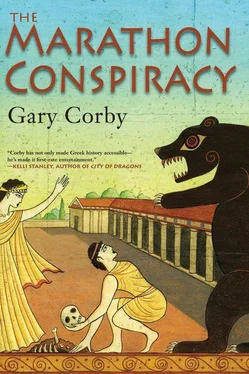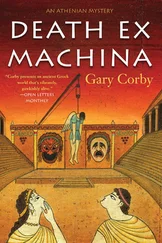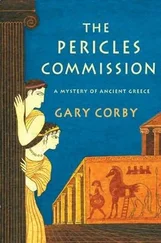Gary Corby - The Marathon Conspiracy
Здесь есть возможность читать онлайн «Gary Corby - The Marathon Conspiracy» весь текст электронной книги совершенно бесплатно (целиком полную версию без сокращений). В некоторых случаях можно слушать аудио, скачать через торрент в формате fb2 и присутствует краткое содержание. Год выпуска: 2014, ISBN: 2014, Издательство: Soho Press, Жанр: Исторический детектив, на английском языке. Описание произведения, (предисловие) а так же отзывы посетителей доступны на портале библиотеки ЛибКат.
- Название:The Marathon Conspiracy
- Автор:
- Издательство:Soho Press
- Жанр:
- Год:2014
- ISBN:9781616953881
- Рейтинг книги:3 / 5. Голосов: 1
-
Избранное:Добавить в избранное
- Отзывы:
-
Ваша оценка:
- 60
- 1
- 2
- 3
- 4
- 5
The Marathon Conspiracy: краткое содержание, описание и аннотация
Предлагаем к чтению аннотацию, описание, краткое содержание или предисловие (зависит от того, что написал сам автор книги «The Marathon Conspiracy»). Если вы не нашли необходимую информацию о книге — напишите в комментариях, мы постараемся отыскать её.
The Marathon Conspiracy — читать онлайн бесплатно полную книгу (весь текст) целиком
Ниже представлен текст книги, разбитый по страницам. Система сохранения места последней прочитанной страницы, позволяет с удобством читать онлайн бесплатно книгу «The Marathon Conspiracy», без необходимости каждый раз заново искать на чём Вы остановились. Поставьте закладку, и сможете в любой момент перейти на страницу, на которой закончили чтение.
Интервал:
Закладка:
Pericles said, “When word gets out about this body-and it will! — everyone will demand answers.”
“Will they? This happened thirty years ago, Pericles. It’s ancient history. Nobody cares.”
“That’s what I thought too. But I was wrong. I’m afraid, Nicolaos, that I’ve made one of my rare blunders. I’ve sat on this skull and these scrolls for ten days and done nothing about them; I didn’t call you in because I thought, like you, that they didn’t matter. But somebody cares. Somebody cares a great deal.” Pericles shifted in his seat and looked distinctly uncomfortable. “I told you two girls found the skeleton.”
“Yes?”
“One of them’s been killed. They say the child was torn apart by some terrible force-”
“Dear Gods!”
“And the other girl’s missing.”
Why would anyone care about an old skeleton, let alone kill a child over it? It didn’t make sense.
I contemplated this as I made my way home. Pericles had no more to tell me. He’d arranged for one of the priestesses-the one who’d walked from Brauron to Athens to report the disaster-to see me at my home that afternoon.
My family lived in the deme of Alopece, which lay just beyond the city wall to the southeast; Pericles lived in Cholargos, beyond the city wall to the northwest. I had to cross virtually all of Athens to make my way home.
I knew these city streets like most men knew their wives. I knew which of the dark, narrow, muddy paths between the houses were shortcuts-these I slipped down, sometimes forced to edge sideways where owners had extended their houses into the street. I knew which routes ended in the blank wall of a house where some builder had encroached a step too far. Most important of all, I knew which alleys afforded the deep, dark shadows, the ones where the cutpurses and the wall-piercers liked to ply their trade. Those streets were good places to avoid.
I knew these things because for a year now I had been an agent and investigator, the only one in Athens. It was a job that didn’t pay well. In fact, so far, it hadn’t paid at all-Pericles still owed me for my very first commission. Despite my occasional prompts, he’d never quite gotten around to delivering on his end of the bargain. That was Pericles all over. Though he was liberal with expenses when the crisis was upon us, Pericles was a different man when all was calm and the bill arrived. I’d managed to survive so far because my needs were few. I lived in my father’s house, as all young men do, and when I was on a job, I could extend the definition of “expenses” beyond its usual borders. Soon, though, I would have no choice but to corner Pericles and force him to cough up my fees, and for a very good reason: when the night of the full moon after next arrived, I would become a man of responsibilities. I would become a married man.
I entered the city proper through the Dipylon Gates in the northwest corner of the city walls, then walked down the Panathenaic Way, which is the city’s main thoroughfare. The road is paved, which keeps down the dust, and is so wide that two full-sized carts can pass each other without touching. The Panathenaic Way runs like a diagonal slash through the city. I passed by the Stoa Basileus on my right, the building in which the Basileus who had first received the skull and the scrolls has his offices. Opposite it was the shrine of the crossroads, which confers good luck on all who pass through the busiest intersection in Athens. I hoped some of the luck might pass to me; I would probably need it.
The Panathenaic Way continued along the northern edge of the agora, then down the eastern side. I came to the temple of Hephaestion, which is surrounded by statues of heroes and gods, and then finally to the marketplace, the perfect opportunity to stop for a cup of wine, to sit in the shade of one of the stoas where men liked to congregate, and to watch the crowds as they haggled. I bought the cheapest vintage I could find and walked away with it in a clay cup. I sipped the wine and stood back to watch the chaos that is the agora of Athens.
Any man who wished to sell his wares that day had paid a permit fee to the state official who oversaw such things, then set up his stall. Each stall was a rickety affair, with a crate at each end and a plank across for a bench. The stalls had to be put up with a minimum of fuss at first light, and come down when it was too dark to trade any longer.
Many of the stalls were manned-if that’s the word-by women: the wives of the men who had rented them. The fishwives sold the catch, and swore loudly as they did. Their fish-smelling husbands had already worked a full day and now had to tend their boats and mend their nets back at the port at Piraeus before they could sleep. Likewise the farmers’ wives had walked into town with their husbands, in the dim dawn light, to sell the farm’s vegetables. The men erected stalls for their women to work from, and then returned to tend the farms. So too for the pottery and the bronze ware: the women of the family traded while the potters potted. In Athens, every business was a family business. I reflected that this was true for me as well. My fiancée Diotima had been my work partner from the moment we met, and that wouldn’t change after we married.
The children of the traders ran in and out among the legs of the shoppers. Sometimes a child might run into a leg, and then an irritated shopper might give the child a whack about the head, but for the most part the men and women in the agora were tolerant of the children at their feet. And no wonder, because these children were our future. In Athens-in all of Hellas-to survive to adulthood was a minor miracle. There were too many diseases, too many infections, too many ways for a child to die.
There’d been an explosion of babies after the Persian Wars. I’d been one of them. Soldiers who’d fought throughout the duration came home to their wives, and ten months later the midwives had more work than they could handle. It was a good thing, too, because the loss of life had been fearful. Athens desperately needed to renew her citizens. Athenians prayed to Hestia, the goddess of the hearth, that not too many of the children would die before they grew.
I returned home to find my fiancée and my mother together in our courtyard. Diotima stood on a statue plinth-my father being a sculptor, we had plenty of spares-with her arms stretched out to both sides. She was a woman of extraordinary beauty, two years my younger, with long, dark tresses that lay curled that moment over her shoulders. My mother, Phaenarete, held a measuring stick to her side and frowned in concentration.
“What are you doing?” I asked.
My mother, with several sewing needles in her mouth, mumbled, “Measuring her for the wedding dress, of course.”
“You want a new dress for your wedding?” I said to my intended. “Don’t you already have enough dresses?”
Both of them gave me scathing looks. My mother continued with her measurements.
“How did the meeting with Pericles go?” Diotima asked, quite deliberately changing the subject.
“Interesting,” I said. “I have more work.” I told her the tale of the strange skull. Diotima listened and didn’t move a muscle, which was most unlike her, but she probably didn’t want a needle stuck in her while my mother fussed about. When I came to the dead girl and the missing one, my mother gasped and almost choked on the needles. After she’d spat them out, she said, “That’s awful!”
I’d known Mother would be displeased. Phaenarete was a midwife and had strong views about children.
But Diotima’s reaction astonished me. She staggered backward. She almost fell off the plinth, but managed to step off at the last moment. There were several dining couches in our courtyard. Diotima collapsed onto the nearest and put a hand to her head.
Читать дальшеИнтервал:
Закладка:
Похожие книги на «The Marathon Conspiracy»
Представляем Вашему вниманию похожие книги на «The Marathon Conspiracy» списком для выбора. Мы отобрали схожую по названию и смыслу литературу в надежде предоставить читателям больше вариантов отыскать новые, интересные, ещё непрочитанные произведения.
Обсуждение, отзывы о книге «The Marathon Conspiracy» и просто собственные мнения читателей. Оставьте ваши комментарии, напишите, что Вы думаете о произведении, его смысле или главных героях. Укажите что конкретно понравилось, а что нет, и почему Вы так считаете.












